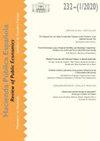加泰罗尼亚保健方面的社会经济不平等
IF 0.5
4区 经济学
Q3 ECONOMICS
引用次数: 16
摘要
在本文中,我们衡量收入相关的不平等程度的心理健康,通过GHQ仪器测量和一般健康,通过EQOL-5D仪器测量加泰罗尼亚人口。我们发现收入是造成不平等的主要因素,尽管可以用收入解释的心理健康不平等的份额远远大于一般健康不平等的相应份额。我们还发现,人口结构的变化减少了心理健康方面的收入不平等,但增加了一般健康方面的收入不平等。这两项保健指标的区域差异是惊人的,巴塞罗那各区与其他地理区域相比情况相对较差,莱莱达是保健区域,在其他条件相同的情况下,其人口报告的健康水平最高。在这两项保健措施中,特别是在心理健康方面,不平等的很大一部分是由于享有无限期合同的人在健康和收入方面比其他人处于有利地位。我们还发现,危险的工作条件既影响健康措施,也能够解释社会经济不平等的重要部分。本文章由计算机程序翻译,如有差异,请以英文原文为准。
Socio-Economic Inequalities in Health in Catalonia
In this paper we measure the degree of income related inequality in mental health as measured by the GHQ instrument and general health as measured by the EQOL-5D instrument for the Catalan population. We find that income is the main contributor to inequality, although the share of inequality in mental health that can be explained by income is much greater than the corresponding share of inequality in general health. We also find that the variation in demographic structure reduces income related inequality in mental health but increases income related inequality in general health. The regional variations in both instruments for health are striking, with the Barcelona districts faring relatively bad with respect to the rest of geographical areas and Lleida being the health region where, all else held equal, the population reports the greatest level of health. A big share of inequality in the two health measures, but specially mental health, is due to the favourable position in both health and income of those who enjoy an indefinite contract with respect to the rest of individuals. We also find that risky working conditions affect both health measures and are able to explain an important share of socio-economic inequality.
求助全文
通过发布文献求助,成功后即可免费获取论文全文。
去求助
来源期刊

Hacienda Publica Espanola-Review of Public Economics
Economics, Econometrics and Finance-Finance
CiteScore
0.90
自引率
14.30%
发文量
14
期刊介绍:
Hacienda Pública Española/Review of Public Economics welcomes submissions on all areas of public economics. We seek to publish original and innovative research, applied and theoretical, related to the economic analysis of Government intervention. For example, but not exclusively: Taxation, Redistribution, Health, Education, Pensions, Governance, Fiscal Policy and Fiscal Federalism.
In addition to regular submissions, the journal welcomes submissions of:
-Survey Reviews, containing surveys of the literature regarding issues of interest in the Public Economics field;
-Policy oriented reviews, showing the current contributions of Public Economics in relation to relevant contemporary issues affecting public decision-makers in the real world (Policy Watch);
-Comments of previously published articles. Contributions to this section should be limited to a maximum of 2 000 words (12 pages). If deemed adequate, the authors of the commented article will be given the opportunity to react in a Reply. Both Comment and Reply will be published together.
Articles for the Survey Reviews and Policy Watch section are subject to the same double blind reviwing procedure. The adequacy of Comments submitted for publication will be evaluated by the Executive Editors.
 求助内容:
求助内容: 应助结果提醒方式:
应助结果提醒方式:


